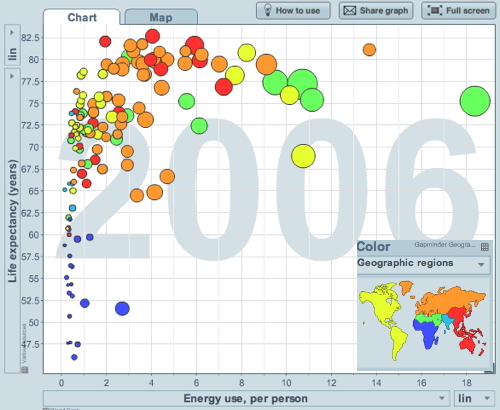Christy Crock #7: People Need Fossil Fuel Energy (Part 1)
Posted on 11 August 2011 by Sarah
Living Better and Longer
Limiting emissions of greenhouse gases will not prevent poor Africans, and the rest of humankind, from gaining a better and longer life. People who use the most energy do not live longer and happier lives than the rest of us. Once you reach a basic quality of life, using ever more resources does not propel you toward immortality and paradise.
Climate scientist and global warming "skeptic" John Christy frequently claims that limiting emissions of climate-changing gases will decrease our quality of life, and he especially weeps for the poor Africans who might be deprived of carbon-belching power plants.
"I happen to think life is precious on the planet, so I look at energy as a real enabler of making human life better and longer."
His arguments are based on two false assumptions: (i) using ever more energy makes "human life better and longer" and, (ii) decreasing emissions makes energy "more expensive and less accessible".
Christy is confusing the basic energy needs of poor Africans with the overuse of planet-polluting fossil fuels by a minority of energy hogs at the top of the economic ladder. It is unfair to compare any improvement in the standard of living of a Nigerian billionaire who purchases a $45M fuel-guzzling private jet with his poor countrywoman who acquires her first solar array (or small wind generator) to power lights, a hotplate, a radio, and a phone. The billionaire African uses much more energy to gain little in quality of life, while the poor African has her life immensely improved with only a small amount of energy. That is, there is saturation effect for the benefits of using more energy (Martinez and Ebenhack, 2008).
Energy is like food: everyone needs a basic minimum to survive; beyond the minimum, modest increments improve quality of life, and excesses are just unhealthy and conspicuous wastefulness. Unfortunately, unlike gluttony, which mainly harms the glutton, wasteful energy use threatens our entire planet, rich and poor alike.
Does more energy make people live longer? You can check this out yourself at Gapminder. Figure 1 shows a Gapminder graph of life expectancy related to per capita energy use. High energy use is not linked to longer lives. Neither are high CO2 emissions, shown by the size of the dots. (Hmm, maybe too much energy use actually decreases lifespans? But, as a scientist, I'd consider other hypotheses before jumping to conclusions.)

Figure 1: Graph of life expectancy (years) vs energy use (in "toe", tonnes of oil equivalent, 1 toe = 42 GJ). The size of the circles gives per person CO2 emissions. Regions are color coded. Australians use 5.9 toe and live 82 years. The two yellow dots at about 8 toe represent the US (78 years) and Canada (81 years).
Furthermore, your quality of life is closely linked to health, which is not improved by soot, sulfur dioxide, NOx, and ozone that come from fossil fuel combustion. And it's invariably the poor who suffer those consequences of the energy gluttony of the rich.
The overwhelming majority of greenhouse gases are emitted by people at the top of the economic scale (including rich people in poor countries) while those with the least resources to adapt are already suffering the consequences. Because the wealthy are the main drivers of climate change, Chakravarty et al. (2009) show that we can prevent climate catastrophe while simultaneously meeting the basic energy needs of the world's poor, and that these two goals are nearly decoupled.
"The wealthiest 700 million people’s consumption is responsible for around half of all GHG emissions while the poorest 2.4 billion people contribute very little," only about 4% of 2003 GHG emissions (Satterthwaite, 2011). If all these people were provided with conventional electric and gas power for basic needs they would still contribute only 8% to global CO2 emissions. Christy should not argue that reductions in greenhouse gas emissions by the wealthiest and most wasteful people on the planet will harm the poorest. On the contrary, the poor are the most vulnerable to climate change and are already feeling the effects of our failure to act.































 Arguments
Arguments
























 0
0  0
0






Comments